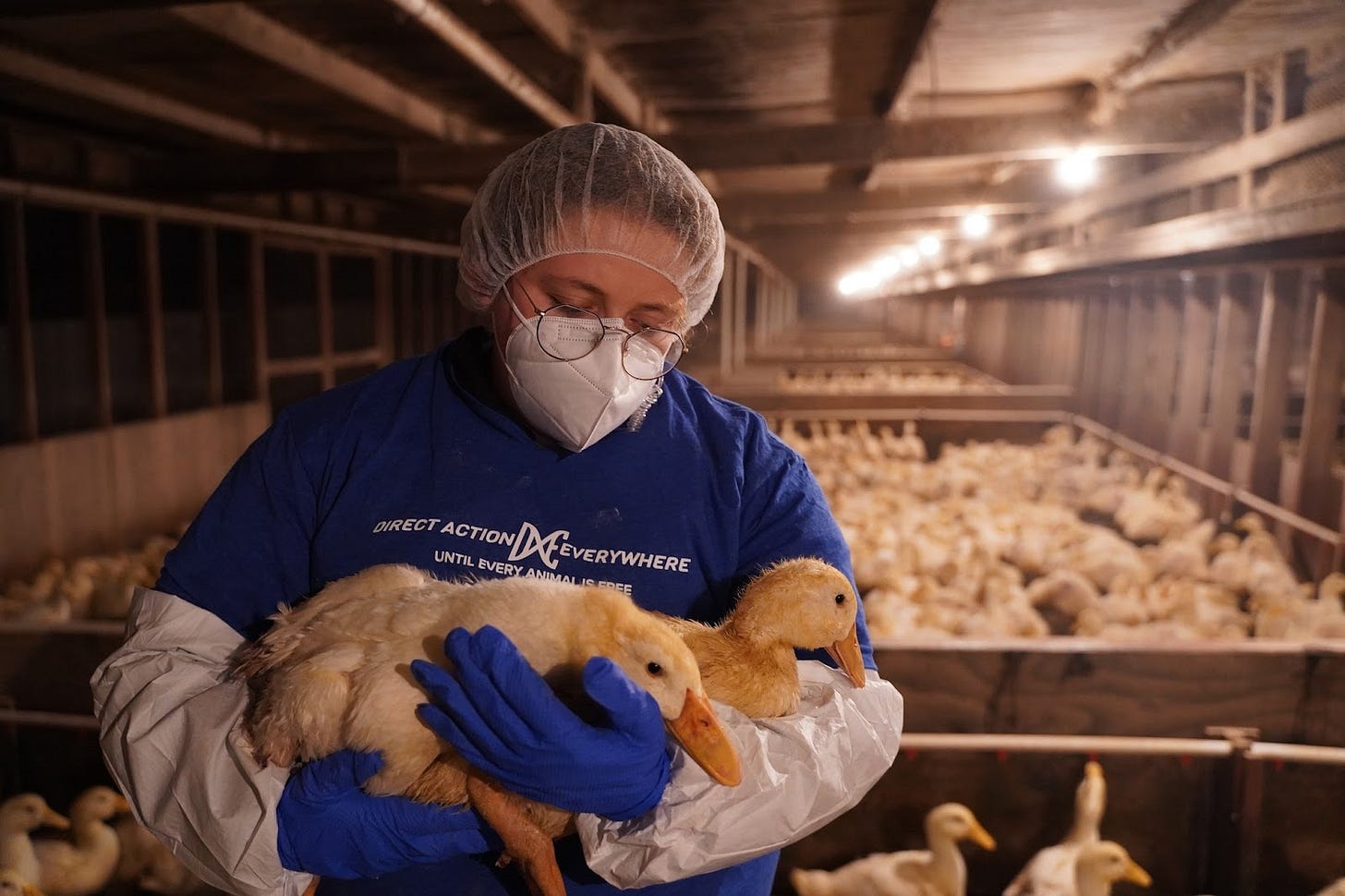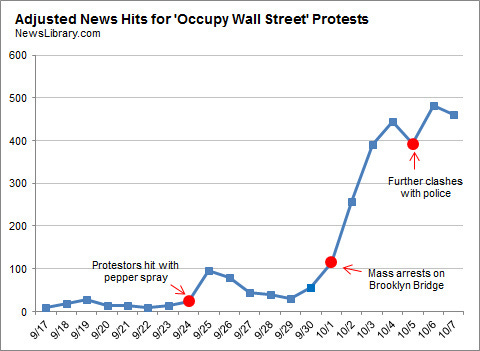How to Make Repression Backfire
On the day of my sentencing, three activists were arrested by undercover police. We can harness those arrests for change.

Just hours after my sentence was announced on November 30, one of my lawyers visited me in jail with troubling news.
“Rocky, Conrad, and Zoe were just arrested. There were undercover police in the march. They grabbed them.” The charges apparently relate to a rescue of birds from Petaluma Poultry at the Animal Liberation Conference 2023, my lawyer said.
I assumed the state and industry would try to ride the momentum of my conviction to go after more activists. And the apocalyptic rhetoric of the industry representatives at my sentencing hearing — the words “terrorism” and “extremism” were repeatedly used to describe people holding flowers — predicted the response would be heavy-handed.
But sweeping people up at a peaceful march surprised even me. The authorities could have just put a legal complaint in the mail. (Indeed, that’s what they did with my case!) A public arrest, with the use of secret police, seems a clear intimidation tactic.
WATCH: Activists being arrested following Wayne’s sentencing hearing
Sadly, these efforts often succeed. In the mid-2000s, the prosecution of activists such as Adam Durand, who openly rescued birds in pitiful conditions from a Wegmans egg farm, placed a chill on the movement. Not just open rescuers, but peaceful leafleters became fearful of the consequences of speaking out.
Based on what happened at my sentencing, one can understand this sort of fear. Mike Weber, owner of Sunrise Farms, mentioned “terrorism” in one breath and “criticisms of my farm,” i.e., speech, in the next.
But here is the key thing: fear is not an inevitable response. Indeed, arrests such as those that occurred on November 30 can supercharge a movement rather than stop it. It all depends on how supporters of the movement react. If we mobilize rather than withdraw, we can turn fear into change.
This is not hypothetical. It’s a lesson from history.
When thousands mobilized in response to Rosa Parks’ arrest in 1955, it was the beginning of racial segregation’s end. The Civil Rights Act passed less than ten years later. When a movement erupted in New York after women were pepper-sprayed by an officer at a small protest called Occupy Wall Street, the “99%” became a force to be reckoned with. No less an authority than Nate Silver, America’s statistical guru, has noted how the media narrative was driven by arrests.

The same is true for animal rights. If you and I respond to the arrest of Zoe, Rocky, and Conrad by getting more active rather than less, the arrests will backfire spectacularly. And there are simple ways to do that right now. Share this blog, for example. The story of a violent industry going after a compassionate young woman and her friends has extraordinary power. But only if you help us tell it to the world.
This can all seem abstract, however, until you know the people now sitting in jail. So let me make this real. Conrad de Jesus is an architect, aspiring novelist, and father of two. A profoundly decent man, his children will now live in fear that their dad will be taken away. Rocky Chau has the biggest smile in every room; he’s greeted hundreds of supporters and activists with an excited and melodic “Hey!” that proves, instantly, that “you are welcomed and you are loved.” His partner, Antonelle, will go to sleep tonight wondering when they’ll hold each other again. And then there is Zoe Rosenberg — TED speaker, sanctuary founder, and champion of open rescue. Zoe is a one woman force for change, and she loves our animal friends more than she loves her freedom and life.
WATCH: Video explains the arrests of Zoe, Conrad, and Rocky
Zoe’s arrest, on the day of my sentencing, was particularly poignant for me. As part of my punishment, I am prohibited from any contact with her — and a dozen or so other people I love dearly — for at least the next two years. Now, Zoe might be taken from all of us. Not just from fellow activists, but her loving family and furry/feathered friends. And all because Zoe dares to speak forbidden truths.
But it’s not just speech that makes Zoe a threat. Exactly one week before her arrest, I received a letter from Zoe in jail.
“It’s strange to imagine you in jail,” she wrote. “I hope I can visit you soon.”
She included in her mailing an autobiography of legendary suffrage activist Emmeline Pankhurst. When I opened the book, I immediately saw Emmeline’s motto: “Deeds, not words.” She lived that motto with her life leading women into prison for acts of “disobedience” that were condemned by those in power. But precisely because Emmeline and other suffrage activists were not afraid, they created change. In 1906, there were 31 women in prison for acts of protest. In 1909, that number jumped to 156, and by 1912, it was 290 (including two men!). Within a decade, women had won the right to vote. “Deeds, not words.” That is the power of courage in the face of fear.
READ: VICE News’s coverage of the arrests
I’ll have no words for Zoe in the next two years, prohibited by court order. But I can promise her my deeds. On the day I am released, you can expect to see me gathering signatures for the Sonoma County factory farm ban, protesting, and doing everything I can to keep Zoe and her friends out of a cage.
I hope you’ll join me in these deeds. If you do, we need not fear these arrests. We can welcome them, as a force for change.
Note: I’ll say more about my sentencing, including the brutal “no contact” term, in my next blog.


Disheartening to hear about all the unjustifiable arrests. No words can describe how hard this is to understand how the good people are imprisoned and the bad ones win.
But the civil rights movement had wide mainstream publicity. With animal issues, except for Unchained TV, there's a complete blackout -- as Jane says, shameful derelection of duty on the part of journalists. There has to be a way to break through this impasse. I wonder what students are being taught in journalism school. What about the teachers and administration -- can we beseech them through heavy letter-writing and calls to muster the courage to cover what's going on?